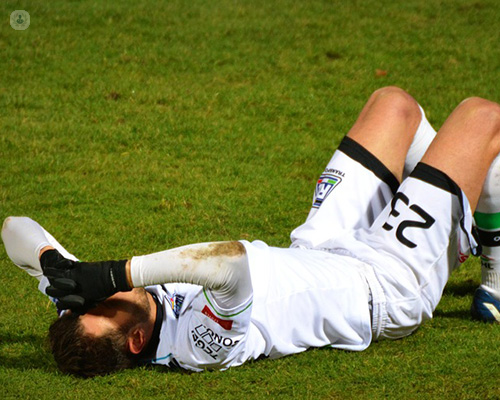What to do if you have a sports injury?
Autore:Sports injuries commonly occur during athletic activities and when exercising. Whether playing tennis, skiing, rugby, football, cycling or running, it is possible to injure any part of the body through sport. The term sports injuries normally refer to injuries of the musculoskeletal system following an activity. Knees and ankles are particularly prone to injury.
Sports injuries can follow accidents such as falls. They can occur through poor technique, and if you haven’t warmed up or warmed down properly. They can also occur if you push yourself too hard. Expert orthopaedic surgeon Mr Henry Atkinson sheds light on the most frequently asked questions on sports injuries.

What are the most common sports injuries?
The commonest sports injuries are:
- Sprains and strains – tearing of the ligaments and tendons, or pulling of the muscles.
- Knee injuries – ACL tear, meniscus tears, ITB friction syndrome, fat pad impingement
- Achilles tendinosis and insertional tendonitis
- Bone fractures and joint dislocations
- Shin splints and stress fractures – which are mostly seen in runners.
What to do if you have a sports injury?
There may be an immediate pain, tenderness, swelling and bruising following a sports injury; though the symptoms may not appear until hours or sometimes days after exercising. There may also be stiffness or reduced movement in the affected area. You should stop exercising if you feel pain. If you continue to exercise through the pain, then you may make things worse.
If you are unable to bear weight on your leg because of pain, then you need to attend your local hospital minor injuries unit or Emergency Department for an x-ray. In these instances, there may have been a fracture which might require a splint, walking boot, a plaster cast or even immediate surgery.
A minor injury does not require seeing a doctor and can be treated with over-the-counter painkillers (such as paracetamol or ibuprofen) to relieve the pain. Your local pharmacy can advise you. The injured area should be rested for up to 3 days to prevent further damage. It is advised to regularly apply an ice pack for 15-20 minutes at a time to reduce swelling in the injured area. Don’t apply ice directly to the skin as this can cause frostbite.
When to see a sports injury specialist?
If the symptoms do not improve within a few days, it is recommended that you should seek help. The first port of call can be with your GP or preferably a sports injury therapist. This will usually be a physiotherapist who will perform a biomechanical assessment and will focus on restoring your mobility and function. The physiotherapist will help you to strengthen the muscles, tendons and tissues, which support the injury.
If your symptoms actually worsen rather than improve, or if they have not resolved by 6 weeks then you should have the injury assessed by a specialist. This will usually be an orthopaedic surgeon who can organise appropriate further imaging such as an MRI scan. Once the full extent of the injury is known then a definitive management plan can be formulated. This may be through ongoing physiotherapy rehabilitation, or through the use of adjuncts such as guided cortisone injections, gait analysis, and orthotics.
Sometimes surgery will be necessary, such as for ACL ruptures and some meniscus tears, and when there is a failure of natural healing. Sometimes surgery is recommended where this will result in a faster and better clinical and functional outcome; particularly where you hope to participate in sports in the future. It may be a difficult decision to make but the surgeon will offer guidance and advice.
How can a sports injury be prevented?
There are ways to reduce the risk of suffering a sports injury. It is important to stretch and warm-up before and after activity. You should take at least one day off per week from playing sports to allow the muscles to recover. You should follow the correct techniques, use correct equipment, wear appropriate footwear, take breaks and drink plenty of water. If you are taking up a new sport or activity it is recommended that you seek advice from a coach, trainer or a qualified fitness instructor.


